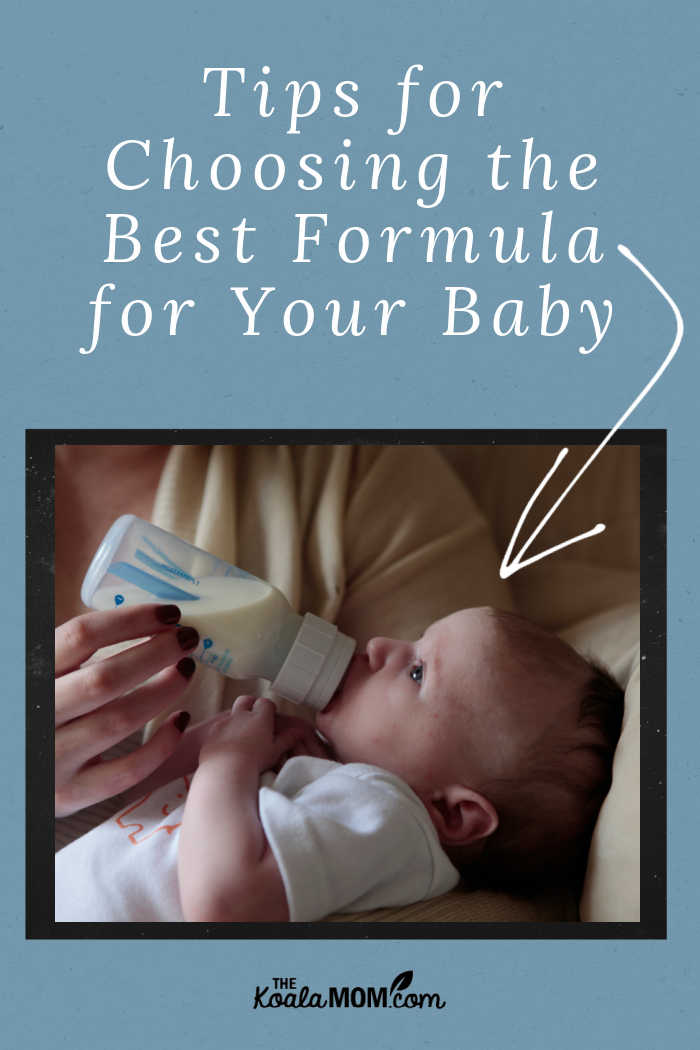Many new parents have an ideal image of how their newborn experience will be. More often than not, this experience in reality is filled with unexpected or unplanned moments. One example is a mom’s idea that she will breastfeed met with the reality that she is unable to produce enough milk. Or perhaps breastfeeding was never an option, and the formula mom tries doesn’t work with her baby’s individual needs.
With the plethora of options for a new parent bombarding you, here are a few simple tips to consider when making the choice to feed your baby formula. Feel free to refer back to these tips after baby is born. I highly encourage you to do further research on the subject as well. Without further ado, here are five tips to consider when choosing baby formula.

1. Organic v. Nonorganic
Depending on your lifestyle choices and budget, the question of using organic baby formula may not even be on your mind. Even if you don’t eat organic food, your baby could highly benefit from choosing organic options. As an adult, our bodies are completely developed and not nearly as sensitive as our baby’s body.
Although research doesn’t actually show that organic food is more nutritious than nonorganic food, choosing organic isn’t about nutrition as much as it is about elimination. The issue a parent should consider when making this choice is the amount of synthetic fertilizers or pesticides that leak into the food supply. Animals grazing on these non-organic foods could be passing toxins into their foods.
Plus, animals that are raised on nonorganic farms could be receiving growth hormones or a wide variety of shots. We don’t know how much of these bad particles leak into the food, but it’s such a difficult task to study the effects. Either way, babies are the most vulnerable to all these toxins, and with a developing body, exposure to harmful chemicals could be very damaging.
2. Sensitivity
You won’t know how sensitive your baby is until you meet him or her, so this is a topic to consider once your baby has arrived. There are multiple “sensitive” options available in baby formulas, but don’t be fooled by the label. Some formulas add or take away ingredients that aren’t useful for baby, and don’t completely address the underlying problem your baby might be having. Speak with your pediatrician about the issues your baby may be experiencing first, before quickly switching to a “sensitive” formula.
A baby may have a sensitivity to the lactose or to a specific ingredient, which can cause a wide array of issues from rashes to reflux to gas, so just know many of the reactions are similar even if the causes are different. Whole milk formula options are a fantastic choice for a baby struggling with reflux, as the extra creaminess and natural prebiotics help soothe their digestion process; however, if your baby has a lactose sensitivity, a whole milk option would cause many problems. In this case you would consider a skimmed milk formula and perhaps even a formula with hydrolyzed milk proteins, which break down the lactose into easier to digest sizes.
3. Ingredients
Please read the ingredients on every one of your baby’s food products. Once again, babies are developing and what they consume really does make huge impacts on their life. One terrible ingredient to avoid is sugar. Sometimes it won’t be labeled sugar, but rather, high fructose corn syrup or glucose syrup solids – in either case, they are all bad! There are many studies that show an increase in obesity with the over-exposure of sugar at young ages. Unfortunately, there are formulas that add this unnecessary ingredient into their products.
Another ingredient you should avoid is soy, because the impact on a developing child can lead to hormonal issues as an adult as well as other various problems. There is a large debate on the use of carrageenan and it’s harmful effects as well, so avoid it if you can. Lastly, do your research on the preservatives, DHA, and synthetic nutrients used in your baby foods as well.
4. Goat vs. Cow Milk Formula
Many parents start their formula journey with cow’s milk; however, not all babies can process cow’s milk as well as goat’s milk. Goat’s milk formula has the A2 protein, which has shown to help decrease inflammation in the gut.
Also, if your baby has a sensitivity to cow’s milk lactose, the goat’s milk proteins form smaller and softer curds in your baby’s gut than cow’s milk – this means your baby can quickly digest without extra tummy problems.
5. European vs. American Formula
The consideration of European formula is becoming increasingly popular among Americans. There are a few different reasons for this, but the largest reason is the higher standards. As the EU is made up of multiple countries, there are many different regulators and processes a baby formula manufacturer must go through. Also, yearly meetings on baby food products are conducted to keep up-to-date with the latest scientific studies.
Another large difference between American and European formula is the different stages that are offered in the infant formulas. American formula only has one stage for the first year of a baby’s life. This means babies that a newborn receives the same formula as babies about to turn one. Since babies develop quickly throughout their first year and need different amount of nutrients, European formulas address this with a different stage of formula at 6 months of age. You will notice the most difference in the amount of iron and carbohydrates between stages.
The search for the perfect baby formula is not an easy endeavor. Not every baby formula works for every baby either, which is why there are so many different options even in the same brands. Be patient and speak with other mommas about your joys and struggles – it really is a great way to relieve some of that built-up stress.

No Responses Yet